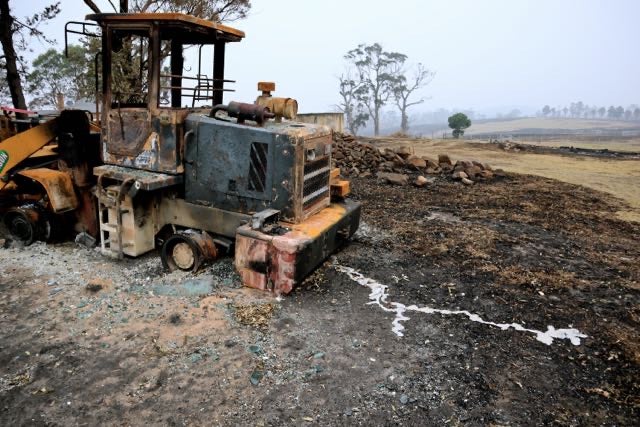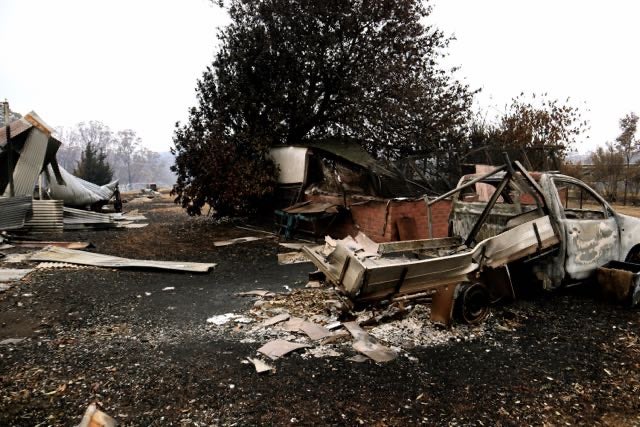I’ve lived through terrible wildfires in Australia – here’s what LA must do now
Wildfires in Los Angeles and Australia highlight the growing impact of climate change and the trauma of survivors, writes Chris Wright as he reflects on his own experiences


The sheds have burned down,” she said, borrowing a friend’s phone. “The truck too. The chickens are dead. Half the cows are dead. The farm is gone, and I don’t know if the house is going to survive…”
These were the first words we’d heard from my aunt in six hours, as a 40-degree New Year’s Day had erupted into a fire that would eventually burn an area twice the size of England to the ground.
She had been trapped inside from 10am until 4pm, as a fireball from a fast-moving firebreak bombed the farm sheds around her, melting the tractor and her car, and decimating a wooden bridge that was the only road access to the property. If it hadn’t been for a neighbour from the next farm, breaking through fences and back paddocks to save her, she may have never made it out.
In that tear-filled phone call, we began to get our first sense of what might be left of my grandfather’s farm – one that had never been touched by fire in the last 150 years.
This is the memory that came back to me this week, watching as fires tore through Los Angeles, having killed 24 people at the time of writing, fueled by wind gusts of up to 100mph, turning towns into tinderboxes. Like this week’s tragedy, we had no idea just how fast fire could spread four years ago either.
We had spent Christmas together on that very farm, and even as we watched new plumes of smoke rise over the western hills, turning the night red, we never thought the fire might turn for us. Just like the thousands of families in the Palisades this week, we felt safe – safer than we should have – even when evacuation orders were issued for the area. We knew that normally fires should pass by on the hills around us. That we would be spared. Only days later, our entire community went up in smoke. At the time, “normal” had nothing to do with it.

The Australian bushfires of 2019-2020 were fuelled by climate change on every level. Not only was that summer incredibly hot, but it had been one of the driest years in the country’s history, and the bushland was bone dry. Even as someone who had studied climate change and could read the signs, I still didn’t realise just how endangered we were.
According to the physicists at ClimaMeter, the winds, heat, and dry conditions leading up to this year’s fire season in Los Angeles are similarly abnormal – all fueled by climate change.
This was the same in 2021, when a climate-fuelled heat dome exploded across North America, burning a 3.2 million-hectare-sized hole through Canada and the US. There is no more “normal” when it comes to fires. Because, as Justin Trudeau said on CNN this week, “What we see now is going to get worse, and worse, and worse in the coming decades.” But Trudeau is no longer Canada’s leader. And the way America’s new leaders have responded to these fires brings back painful memories of our own cynical and downright lazy leadership at the time.

On the day our farm burned down, our then-prime minister, Scott Morrison, was watching the sun go down while drinking cocktails in a Hawaiian shirt – literally in Hawaii, 5,000 miles away. When asked about it later, he famously said, “What do you want me to do? I don’t hold a hose, mate.” This would eventually be his political undoing.
Only two weeks ago, he happened to celebrate New Year’s Eve with Donald Trump and Elon Musk, who have spent their almost infinite economic and political power turning the Los Angeles tragedy into a crass political punching bag, using it for all their greatest right-wing hits.
They blamed the fires on women, on diversity policies, on the ‘globalist’ agenda ... basically everything except for climate change
While bunkered down over 2,000 miles away at Mar-a-Lago, they have blamed the fires on women, on diversity policies, on the “globalist” agenda, on endangered animals, on local leaders, and basically everything except for climate change. In the next few weeks, they will be in power and will likely do everything they can to discredit the LA Fire Department, the Environmental Protection Agency, and the National Oceanic and Atmospheric Administration’s work on climate science, as outlined in Project 2025.
And that may be the hardest time of all for the survivors of this ongoing tragedy. It is one thing to lose a home, to lose a sketch from a child’s art class, to lose your dad’s cassette tape collection of Seventies rock concerts, to lose your sense of self, and your sense of where you feel safe. To lose a loved one.
But it is another thing altogether when you’re denied the grace to grieve. When you know, deep down, what caused your heart to break, and those who could bring justice just deny it.
When this fire is over, it will leave thousands of people caught in a time warp of insurance claims, medical check-ups, clean-ups, and trauma.
The insured losses from this week’s fires alone may exceed $20bn (£16.5bn), and the trauma of all those making claims, those denied coverage, and those deemed uninsured will carry scars for many years to come. So many memories will suddenly be referred to by insurance agents as nothing more than liability equations on Excel spreadsheets.
Then, when survivors seek out support from their leaders in the weeks and months ahead, I fear for what they will find.
Join our commenting forum
Join thought-provoking conversations, follow other Independent readers and see their replies
Comments
Bookmark popover
Removed from bookmarks